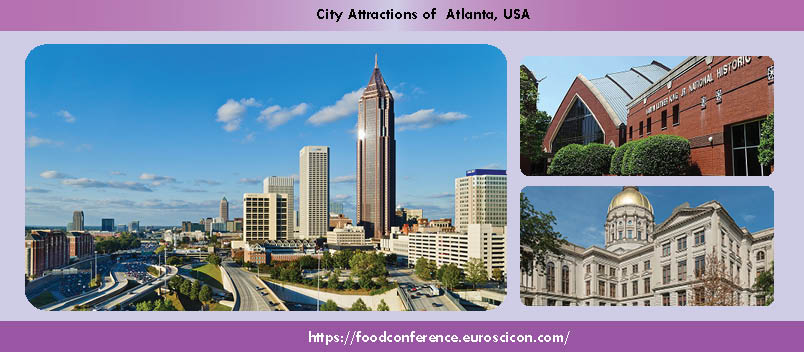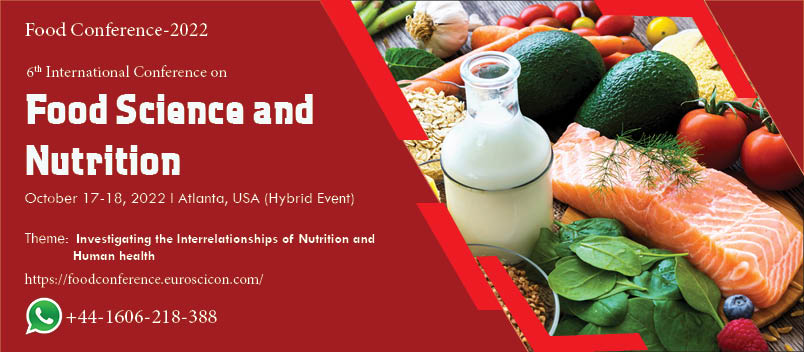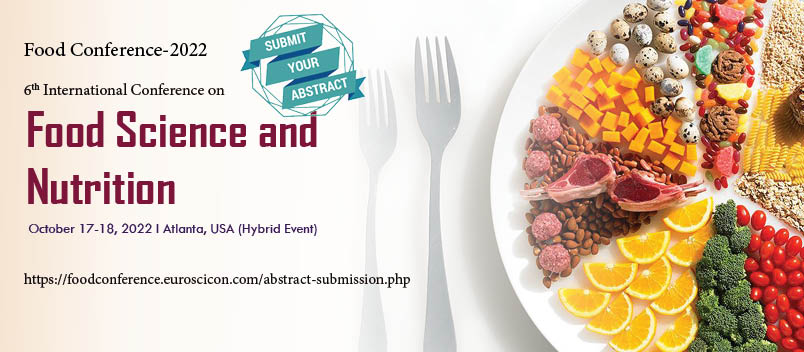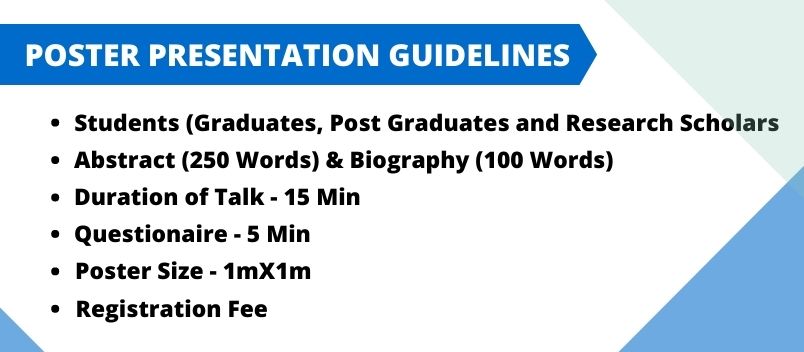food conference 2022
About Conference
Euroscicon Ltd offers all the participants from all over the Globe to attend "6th International Conference on Food Science and Nutrition" during November 14-15, 2022 at Vancouver, Canada. It includes prompt Keynote presentations, Oral presentations (Speaker forum and Young research forum), Poster presentations, and Exhibitions. This is going to be one of the most notable events of the year. It will bring all the Scientists, Professors and Delegates together for a remarkable success.
The Theme of the Conference is "Investigating the Interrelationships of Nutrition and Human health". The main objective is to bring all the leading academic scientists, researchers and research scholars together to exchange and share their experiences and research results about all the aspects of Food. It also provides the premier interdisciplinary forum for researchers, practitioners and educators to present and discuss the most recent innovations, trends, and concerns, practical challenges encountered and the solutions adopted in the field of Food. The conference program will cover a wide variety of topics relevant to the Food Science, including: Food Safety, Food Laws and Regulations, various technologies in Food Industry, Food Toxicology, Food Security Food Science Development, Food packaging, Nutritional Health, Food Regulations, Food Composition Food Safety and Hygiene and so on.
Why to Attend?
Food Conference 2022 could be an exceptional event that brings along a novel and International mixture of Food analysis techniques and technology, leading universities and pathology analysis establishments creating the conference an ideal platform to share expertise, foster collaborations across trade and world, and assess rising technologies across the world. World-renowned speakers, the most recent techniques, tactics, and the newest updates in Food fields are hallmarks of this conference.
Importance and Scope of Food Conference 2022:
Food Conference is a public health priority; millions of people fall ill every year and many die as a result of eating unsafe food. Serious outbreaks of foodborne disease have been documented on every continent in the past decade, and in many countries rates of illnesses are increasing significantly. Food Fraud is a global issue concerning the Food Regulation worldwide for the public health and safety perspective on moral and social grounds.
International Conference on Food focused on learning about Food Health/Food Safety and its advances; this is your best opportunity to reach best Researchers, Food technicians and the largest assemblage of participants from the Food Community. Our Food Conference planned keeping in mind with best scientific sessions, exhibitions, poster presentations, oral presentations, workshops, symposiums, luncheons, and great keynotes. World-renowned speakers, the most recent techniques, developments and the newest updates in Food Safety are hallmarks of our conference.
Related Conferences: Food Science Conferences | Global Food and Beverage Conferences | Food Chemistry Conference | Nutrition Conferences | Food Technology Conferences | Food and Nutrition Conferences 2022 | Nutrition Conferences 2022 | American Society for Nutrition Conference 2022
Who Can Attend the Conference?
· Presidents
· Vice presidents/Directors
· Academicians
· Food Researchers
· Food Scientists
· Business delegates
· Food Experts
· Food Departmental managers
· Professors and students from Academia
This is an open event, we welcome and invite you to participate in this prestigious conference to make event as the best Food event in Vancouver.
SESSIONS &TRACKS
Track 1: Food Science
Food science is the study of the physical, biological, and chemical makeup of food; and the concepts underlying food processing. Food technology is the application of food science to the selection, preservation, processing, packaging, distribution, and use of safe food.
- Food and nutritional security
- Sustainable intensification of food production systems
- Innovative ways of feeding increasing population
- Food storage and technology
- Fermentation Technology and Cereals
- Food packaging
- Post-Harvest Handling and Processing
Track 2: Food Safety & Hygiene
Food safety is a scientific discipline describing handling, preparation, and storage of food in ways that prevent food-borne illness. The occurrence of two or more cases of a similar illnesses resulting from the ingestion of a common food is known as a food-borne disease outbreak.
- Food Safety
- Food Safety Laws And Regulations
- Risk Analysis And Management
- Food Preservation And Quality Standard
- Food Safety In Retail Foods
Track 3: Food Technology
Food technology is a branch of food science that deals with the production processes that make foods.Early scientific research into food technology concentrated on food preservation. Nicolas Appert’s development in 1810 of the canning process was a decisive event. The process wasn’t called canning then and Appert did not really know the principle on which his process worked, but canning has had a major impact on food preservation techniques.
- Food Technology
- Agri Food Technology
- Food Engineering and Processing
- Chemistry of Food and Bio-processed Materials
- Food and Dairy Technology
- Food Microbiology
Track 4: Food production, preserving & packaging
Food production is the process of transforming raw ingredients into prepared food products. Food production includes industries that take raw food products and convert them into marketable food items. Home food production includes converting produce into forms for long-term storage. Food processing is the process of changing or transforming raw food materials into consumable forms or products. Food processing offers many advantages such as prolonging the life span of the food, preventing food from going bad, for easy packaging etc. Food preservation involves preventing the growth of bacteria, fungi (such as yeasts), or other micro-organisms (although some methods work by introducing benign bacteria or fungi to the food), as well as slowing the oxidation of fats that cause rancidity.
- Food Biochemistry and Food Processing
- Emerging food processing techniques
- Non-thermal processing
- Food security
- Food Packaging
- Antimicrobial food packaging
- Types of packaging
- Constraints on adequate packaging
- Packaging materials
Track 5: Food Rheology & Sensory Analysis
Food rheology is the study of the rheological properties of food, that is, the consistency and flow of food under tightly specified conditions. The consistency, degree of fluidity, and other mechanical properties are important in understanding how long food can be stored, how stable it will remain, and in determining food texture. The acceptability of food products to the consumer is often determined by food texture, such as how spreadable and creamy a food product is. Food rheology is important in quality control during food manufacture and processing. Food rheology terms have been noted since ancient times. In ancient Egypt bakers judged the consistency of dough by rolling it in their hands. Sensory analysis (or sensory evaluation) is a scientific discipline that applies principles of experimental design and statistical analysis to the use of human senses (sight, smell, taste, touch and hearing) for the purposes of evaluating consumer products.
- Chemical reactions in foods: mechanisms, kinetics and impact on quality and health
- Emerging non-nutrient bio actives in food - chemistry, analysis, function and health
- Food biochemistry
- Chemistry of baked food
- Enzyme analysis of Diary, vegetable and crop foods
- Flavour and texture of food
- Rheology of wheat doughs, cheese and meat
Track 6: Food Biotechnology Studies
Biotech crop was commercialized in 1996; some food activists have raised uncertainty about whether or not biotech crops are as safe as conventional crops. The use of agricultural biotechnology increases globally (currently biotech crops are preferred by more than 15 million growers in 29 countries), people need to be better informed about food production. Biotechnology has proven to be an essential tool in meeting this challenge of increasing our safe and affordable food supply. Biotechnology helps farmers to grow crops that resist diseases and pests and that require less fertilizers. Future technologies will enable farmers to grow crops that are drought-tolerant, or freeze-tolerant, and crops that have an increased nutritional value – this is especially important in developing countries where malnutrition and food poverty has reached tragic levels.
- Role of biotechnology in food supply
- Genetically modified foods
- Applied Biotechnology in Food processing
- Applied Biotechnology in Food preservation
Track 7: Agriculture Engineering
Agricultural Engineering is the engineering discipline that studies agricultural production and processing. Agricultural engineering combines the disciplines of mechanical, civil, electrical and chemical engineering principles with a knowledge of agricultural principles according to technological principles. A key goal of this discipline is to improve the efficacy and sustainability of agricultural practices
Agricultural engineers typically do the following:
- Use computer software to design equipment, systems, or structures
- Modify environmental factors that affect animal or crop production, such as airflow in a barn or runoff patterns on a field
- Test equipment to ensure its safety and reliability
- Oversee construction and production operations
- Plan and work together with clients, contractors, consultants, and other engineers to ensure effective and desirable outcomes
Agricultural engineers main role is to solve problems found in agricultural production. Goals may include designing safer equipment for food processing or reducing erosion. To solve these problems, agricultural engineers must creatively apply the principles of engineering.
- Agricultural Ecology & Agricultural Geology
- Agriculture Technical Processes
- Novel Agricultural Machinery
- Nanotechnology in Agriculture
- Polymers in Agriculture & it’s Application
- Modeling of Spray Deposition on Tree Canopy
- Sensor Technology in Agriculture
- Precision Farming, Remote Sensing and Agri GIS
- Remote Sensing for Detection of Plant Stress
Track 8: Plant & Agricultural Biotechnology
Agricultural biotechnology is the term used in crop and livestock improvement through biotechnology tools. Biotechnology encompasses several tools and elements of conventional breeding techniques, bioinformatics, microbiology, molecular genetics, biochemistry, plant physiology, and molecular biology. The biotechnological tools that are important for agricultural biotechnology include conventional plant breeding, tissue culture and micropropagation, molecular breeding or marker-assisted selection, and genetic engineering and GM crops. The present and future focus is on continuing improvement of agronomic traits such as yield and abiotic stress resistance in addition to the biotic stress tolerance of the present generation, crop plants as biomass feedstocks for biofuels and “biosynthetic,” value-added output traits such as improved nutrition and food functionality, and plants as production factories for therapeutics and industrial products
- Genetically Modified Crops
- Genomic Technology for Tropical Agriculture
- Micro propagation in Plants
- Agronomic & Quality Traits
- Green Plant Biotechnology
- Novel Plant Tissue Culture Methods & it’s Applications
- Genetic Engineering
- Plant Plastics: Production & Applications
- Plant Proteomics, Synthetic Biology and Transcriptome
- Biomass, Biofuel and By-product of various Plants
- Plant Microbiology& Plant immunology
- Genes and Traits for Improved Crop Production
Track 9: Agricultural Chemistry
The goals of agricultural chemistry are to expand understanding of the causes and effects of biochemical reactions related to plant and animal growth, to reveal opportunities for controlling those reactions, and to develop chemical products that will provide the desired assistance or control. Every scientific discipline that contributes to agricultural progress depends in some way on chemistry. Hence agricultural chemistry is not a distinct discipline, but a common thread that ties together genetics, physiology, microbiology, entomology, and numerous other sciences that impinge on agriculture. Chemical materials developed to assist in the production of food, feed, and fiber include scores of herbicides, insecticides, fungicidesand other pesticides, plantgrowth regulators, fertilizers, and animal feed supplements. Chief among these groups from the commercial point of view are manufactured fertilizers, synthetic pesticides (including herbicides), and supplements for feeds. The latter include both nutritional supplements (for example, mineral nutrients) and medicinal compounds for the prevention or control of disease. Agricultural chemistry often aims at preserving or increasing the fertility of soil, maintaining or improving the agricultural yield, and improving the quality of the crop.
- Nitrogen Fixation
- Agricultural Chemicals
- Involvement of Organic & Inorganic Chemistry
- Low Carbon Agriculture for Sustainable Development
- Agrochemical Application & Technology
- Plant Breeding and Molecular Breeding
- Harvesting & Post-Harvest Technology
- Plant Breeding & Phytology
- Biosynthetic Enzymes & it’s Impacts
- Global Warming & Agriculture
Track 10: Agriculture, Forestry & Landscaping
Agroforestry is an intensive study on a land management system that benefits biological interactions between forest trees or shrubs and agricultural crops and/or livestock. There are five basic types of agroforestry practices have been developed: windbreaks, alley cropping, silviculture, riparian buffers and forest and hill farming. Agroforestry helps to conserve species diversity and protect natural resources, reduce pollution, control soil erosion, and enhance wildlife biodiversity. The benefits of agroforestry include improvement of the growth of agro-economy and resource sustainability. Agroforestry practices also influence agroecosystem and diversification of endangered crop species. The greatest research need is to develop farm-level analyzes to increase potential economic costs, benefits which may reduce risks associated with agroforestry practices and increase the market value of products. This is a vital prerequisite to the objective comparison of both production and conservation-driven agroforestry practices with alternative land use options. Furthermore, awareness should be raised among farmers and labors to improve the future market value of regional, national and international markets for commodities that can be produced through agroforestry system. Research on tree-crop-animal-environment interactions should be pursued to provide a scientific basis for optimizing agroforestry designs.
- Biomass Utilization
- Agriculture Waste Management & Methods
- Soil and Hydrological conservation
- Forest Ecology and Biodiversity
- Grassland and Natural Resource Management
- Landscape Restoration and Agroforestry
- Applications of Agroforestry
- Alley & Strip Cropping
- Wood Science and Technology
- Forest Conservation & Terrestrial Ecosystem
Track 11: Agronomy & Horticulture
Agronomy is the science and technology of producing and using plants for food, fuel, fiber, and land reclamation. Agronomy has come to encompass work in the areas of plant genetics, plant physiology, meteorology, and soil science. It is the application of a combination of sciences like biology, chemistry, economics, ecology, earth science, and genetics. Agronomists of today are involved with many issues, including producing food, creating healthier food, managing the environmental impact of agriculture, and extracting energy from plants. Agronomists often specialize in areas such as crop rotation, irrigation and drainage, plant breeding, plant physiology, soil classification, soil fertility, weed control, and insect and pest control.
Horticulture deals with the art, science, technology, and business of fruits, vegetables, flowers and ornamental plants. It includes production, improvement, marketing and scientific analysis of medicinal plant, fruits, vegetables, nuts, seeds, herbs, sprouts, mushrooms, algae, flowers, seaweeds and non-food crops such as grass and ornamental trees and plants. It also deals with species conservation, landscape restoration, landscape and garden design, management, and maintenance, research, and marketing. Horticulturists apply their knowledge, skills, and technologies to grow plants for human food and non-food uses like garden or landscape design, decorations etc. Their field also involves plant propagation and tissue culture to improve plant growth, diversification, quality, nutritional value, and resistance and adaptation strength to environmental stresses. Agriculture conference gives an opportunity to researchers and scientist to explore the advanced and latest developments in the field of Horticulture and its related field.
- Sustainable Intensification
- Organic Farming
- Grass and Forage Science
- Agroecology, Agrophysics & Agrology
- Green Revolution
- Modern Techniques for Vegetation
- Horticulture Therapy
- Turf management
- Intensive Cropping Patterns & Integrated Farming Systems
- Novel Arboriculture Techniques
- Rice & Wheat Research
- Floriculture & Viticulture
Track 12: Crop Science
Crop science is the highly integrative science including plant breeding, transgenic crop improvement, plant physiology and improved varieties of agronomic turf using developed cropping system and local crops to produce food, feed, fuel, fiber for growing population. Last century crop science achieved successes, now which are the part of everyday life. The role of crop science for biofuel production will increase upcoming year. Starch, carbohydrate, sucrose that can be converted to biofuel and ethanol for optimization of biomass yield and minimizing the inputs of fertilizer, irrigation and pesticides, it is needing to grow all bioenergy crops. And for minimize the competition between biofuel crops and human food crops.
- Crop Biotechnology
- Genome-edited Crops
- Crop Genetics and Breeding
- Efficient Crop Production
- Crop Protection & Entomology
- Crop and Pasture Sciences
- Dwarfing Gene Techniques
- Crop Modelling & Hybrid Technology
- Agronomic Technologies
- Seed Technology & Research
Track 13: Soil Science & Research
Soil provides ecosystem necessary for plants and animal life. Soil acts as a base medium provide habitat, water, and nutrition to living organisms. The soil is used as a holding and interacting facility for nutrients, microorganisms, plants and water. The soil is responsible for Agro ecosystems and Eco-agriculture which indirectly help in food security. Soil purifies groundwater, provides nutrients, help in the growth of plants and regulate the Earth's temperature. Industrial, household, and non-point source pollution negatively influence soil environment and finally the whole ecosystem. In recent decades, scientists have developed new practices which limit the mobility of contaminants which reduce pollution. Agriculture conference gives a chance to researchers and scientist to explore the latest and modern developments in the field of Soil Sciences and its related technology.
- Soil Health & Chemistry
- Soil Microbiology and Soil Remediation
- Microbial Inoculant
- Soil Morphology & Geology
- Soil Fertility and Plant Nutrition Analysis
- Improving Soil Fertility Health
- Soil Physics and Advanced Biophysical Techniques
- Evaluation of Soil Structural Quality
- Soil Compaction & Consolidation
- Soil Carbon in Tillage Systems
Track 14: Fertilizers & Pesticides
Fertilizer is any material of natural or synthetic origin that is applied to soils or to plants tissues to supply one or more plant nutrients essential to the growth of plants. Fertilizers enhance the growth of plants. This goal is met in two ways, the traditional one being additives that provide nutrients. The second mode by which some fertilizers act is to enhance the effectiveness of the soil by modifying its water retention and aeration.
Pesticides are substances meant for attracting, seducing, and then destroying, or mitigating any pest. They are a class of biocide. The most common use of pesticides is as plant protection products (also known as crop protection products), which in general protect plants from damaging influences such as weeds, plant diseases or insects. This use of pesticides is so common that the term pesticide is often treated as synonymous with plant protection product, although it is, in fact, a broader term, as pesticides are also used for non-agricultural purposes.
- Impact of Fertilizers & Pesticides Use in Agriculture
- Applications of Fertilizers & Pesticides
- Production and Application of Biofertilizers & Biopesticides
- Constraints in Biofertilizer Technology
- Azolla-Anabena Symbiosis
- RNAi & Biochemical Pesticides
- Radiocarbon and Soil Carbon Dynamics
- Nitrogen & Phosphate Fertilizers
- Potassium & Compound Fertilizers
- Organic Fertilizers
Track 15: Food Nutrition & Health
Nutrition is the science that interprets the interaction of nutrients and other substances in food (e.g. phytonutrients, anthocyanins, tannins, etc.) in relation to maintenance, growth, reproduction, health and disease of an organism. It includes food intake, absorption, assimilation, biosynthesis, catabolism and excretion. The diet of an organism is what it eats, which is largely determined by the availability, processing and palatability of foods. A healthy diet includes preparation of food and storage methods that preserve nutrients from oxidation, heat or leaching, and that reduce risk of food-borne illnesses. A poor diet may have an injurious impact on health, causing deficiency diseases such as blindness, anemia, scurvy, preterm birth, stillbirth and cretinism; health-threatening conditions like obesity and metabolic syndrome; and such common chronic systemic diseases as cardiovascular disease, diabetes, and osteoporosis.
- Food Nutrition & its Assessment
- Nutrition Therapy
- Nutritional Deficiency Diseases
- Single Cell Protein Supplements
- Nutritive & Non-Nutritive Components of Food
- Neonatal Nutrition
- Food & its Calorific Value
- Sea Food Processing & its Nutritional Value
- Herbal Nutritional Supplements
- Nutri-Genetics & Disorders
Track 16: Food Science & Technology
Food Science and Technology is the multidisciplinary field that has the comprehensive knowledge of biological and physical sciences for the development of new food products and processing technologies, improvement of food quality, nutrition value and safety of food. Food Science is now also balanced with the technology to improve the wholesome of the food processing and supply.
Track 17: Sports Nutrition and Kinesiology
Sports nutrition is a rapidly evolving field of research that brings together knowledge about exercise and human nutrition that improve athletic performance. Nutrition is a core part of sports and mainly focuses on the type of fluid and the amount of food consumed by the athlete. Kinesiology is the study of human movement that provides detailed information about the state of health. The use of kinesiology to improve human well-being includes physical education, rehabilitation, fitness and safety, health improvement, work environment, sports, and exercise.
Track 18: Food and Nutritional Metabolomics
Metabolomics focuses on high-throughput characterization of small molecule metabolites in biological matrices. Nutritional Metabolomics is the complexity between health & diet. It is used to utilize the small molecule & convert their chemical nature into Related Nutrition Conferences: Asian Congress of Nutrition. Portuguese Association of Enteric and Parenthetic Nutrition. Asian Pan-Pacific Society for Pediatric Gastroenterology, Hepatology and Nutrition Annual Meeting. American Society of Nutrition (ASN) Annual Meeting. ASPEN Nutrition Science and Practice Conference. Conference on Federation of African Nutrition Societies. International Congress of Nutrition. International Symposium of Prebiotics and Probiotics in Pediatrics. Nestlé International Nutrition Symposium. Annual European Microbiome Congress. The Food & Nutrition Conference & Expo International Plant-Based Nutrition Healthcare Conference
Track 19: Food Processing and Technology
The Food Processing is the transfiguration of prepared ingredients by physical or chemical means into food or food into other forms. The food industry blends raw food ingredients to supply marketable food products which will be easily prepared and served by the buyer. Food processing typically includes actions such as chopping and macerating, liquefying, emulsifying, and preparing food (e.g., boiling, frying, frying, or grilling); pickling, pasteurization, and many other types of canning; and canning or other packaging.
Track 20: Nutrition and Dietetics
Nutrition science studies the effects of food on our health when our body consumes it, while Dietetics applies nutrition science to prevent and treat disease and promote health especially with the practical approach of a scientific understanding of nutrition. Dietitians evaluate, diagnose, and treat nutrition and nutritional problems at the individual and broader public health level.
Track 21:Clinical Nutrition and Metabolism
The zones of enthusiasm for Nutrition and Metabolism envelop thinks about in atomic nourishment with regards to heftiness, diabetes, lipidemia’s, metabolic disorder and exercise physiology. Original copies identified through subatomic, cellular and human digestion, supplementation discovery, and collaboration on supplement quality are also as enthusiastic as recordings that use new and creative systems such as metabolomics / lipidomic or other omics-based biomarkers to predict nutritional status and metabolic disorders.
Track 22: Nutritional Deficiency and Disorders
Malnutrition disorders or Nutritional Deficiency can include inadequate or over-dieting, weight gain and dietary problems, and persistent illnesses such as cardiovascular infections, hypertension, illness, and diabetes. Healthy illnesses also include formative abnormalities that can be counteracted by abstinence from food, an innate metabolic problem that responds to dietary treatment, the relationship of diet and supplementation with drugs, food allergies and intolerances, and potential food hazards.
Track 23: Prebiotics and Probiotics
Probiotics are living microorganisms that are very beneficial for our human body, especially for the digestive system. Probiotics act as a balance between harmful and beneficial microorganisms. Probiotics should be used as a dietary supplement and not as a medicine. Prebiotics can stimulate the growth or activity of beneficial microorganisms in the body. One example is gastrointestinal fat. Both probiotics and prebiotics are intermediate between food and medicine.
Track 24: Wellness and Public Health
Public health promotes and protects the health of people and the communities and prevents to lay sick with the medium of awareness and many more that leads to the Wellness. Wellness is an active process of awareness and decision-making for a healthy and fulfilling life. Wellness is more than the absence of disease; it is a dynamic process of change and growth.
Track 25: Nutrigenetics and Nutrigenomics
While nutrigenetics provides information about how your specific genome should determine what and how to eat to maximize health, nutrigenomics is all about how the foods you choose alter the expression of your genes. These changes can have a big impact on health, well-being, weight, and fitness.
Track 26: Obesity and Weight Management
Obesity is a complex disease associated with excessive fat in the body. Obesity is not just a cosmetic issue. It is a medical problem that increases the risk of other diseases and health problems such as heart disease, diabetes, high blood pressure, and certain types of cancer. Weight Management is to maintain a healthy body weight by increasing the physical activities regularly and healthy diet and thus helps in reducing the obesity.
Track 27: Food and Nutritional Science
The two terms Food Industry and Nutrition Science are similar in that they both focus on food and their meanings vary greatly. Nutrition studies the relationship between foods and their effects on human health. Nutrition addresses topics such as obesity, malnutrition, and food insecurity. In comparison, Food Science looks at the chemical, biological and physical properties of food in relation to the production, processing, and https://www.nutritionalconference.com/storage of food.
Track 28: Food Chemistry and Biotechnology
Food chemistry generally combines chemical processes and interactions of all biological and non-biological components of food. Biological substances include food such as meat, poultry, salad, beer, milk. It is as similar as biochemistry in its main components such as carbohydrates, lipids, and protein, but also includes areas such as water, vitamins, minerals, enzymes, food additives, flavors, and colors. Food biotechnology is generally the use of technology to modify the genes of food sources. Our food sources are basically animals, plants, and microorganisms. Through food biotechnology, we create new species of animals and plants, such as the animals and plants that we eat.
Market Analysis
Food Technology Market: Overview
Emerging food technology is innovating the way local restaurant food is sourced and distributed and creating growth opportunities for food technology or online delivery platforms as well internet kitchen in the market. This advancement in food technology or online delivery platforms is generating lots of opportunities for restaurants in the food ordering industry.
Consumers nowadays prefer ordering their favorite meal through online platforms, with unlimited access to the number of restaurants. Consumers also have the convenience of selection, customization and can order food from the restaurants based on ratings and reviews.
Due to the superior ease of accessibility of online food delivering platforms, the food technology market is growing at a faster pace. The food technology web platforms are highly adopted by consumers and are proliferating due to the increase in usage of smartphones and the internet.
These food technology platforms help restaurants in achieving customer reach and to earn additional revenue as well as improve their resource utilization. Food technology is the listing platform that helps restaurants in increasing the awareness about the business. With the changing lifestyle and high standard of living, consumers are mainly dependent on services that help them in saving time and offer convenience simultaneously.
The trends of food delivery have transformed profoundly, particularly in the ways many restaurants and food chains are generating revenue. The advertisement for food technology apps such as online food ordering and online grocery apps is an upcoming method of generating revenue.
The food technology companies are offering restaurants with a large customer traffic and in exchange of that the food technology companies take the transactional fee on ordering food online through the restaurants on their application, which helps them to increase their revenue.
Food Technology Market: Dynamics
The increasing penetration of the internet and usage of the smartphones are the primary factors driving the growth of the food technology market. Also, these food technologies are used as online food delivery platforms that help restaurants in increasing their customer reach and generate additional income. This is one of the factors driving the growth of the food technology market.
Many restaurants who have collaborated with food applications for delivering their services are unable to reach customers because of factors such as low ratings over the application and user reviews that may not be true.
Past Conference
Euroscicon Ltd offers all the participants from all over the Globe to attend "Global Summit on Food conference" during November 26-27, 2020 at Greece, Athens. It includes prompt Keynote presentations, Oral presentations (Speaker forum and Young research forum), Poster presentations, and Exhibitions. This is going to be one of the most notable events of the year. It will bring all the Scientists, Professors and Delegates together for a remarkable success.
The Theme of the Conference is "Global pandemic effect on food supply and distribution". The main objective is to bring all the leading academic scientists, researchers and research scholars together to exchange and share their experiences and research results about all the aspects of Food. It also provides the premier interdisciplinary forum for researchers, practitioners and educators to present and discuss the most recent innovations, trends, and concerns, practical challenges encountered and the solutions adopted in the field of Food. The conference program will cover a wide variety of topics relevant to the Food Science, including: Food Safety, Food Laws and Regulations, various technologies in Food Industry, Food Toxicology, Food Security Food Science Development, Food packaging, Nutritional Health, Food Regulations, Food Composition Food Safety and Hygiene and so on.
Why to Attend?
Food Conference 2020 could be an exceptional event that brings along a novel and International mixture of Food analysis techniques and technology, leading universities and pathology analysis establishments creating the conference an ideal platform to share expertise, foster collaborations across trade and world, and assess rising technologies across the world. World-renowned speakers, the most recent techniques, tactics, and the newest updates in Food fields are hallmarks of this conference.
Importance and Scope of Food Conference 2020:
Food Conference is a public health priority; millions of people fall ill every year and many die as a result of eating unsafe food. Serious outbreaks of foodborne disease have been documented on every continent in the past decade, and in many countries rates of illnesses are increasing significantly. Food Fraud is a global issue concerning the Food Regulation worldwide for the public health and safety perspective on moral and social grounds.
International Conference on Food focused on learning about Food Health/Food Safety and its advances; this is your best opportunity to reach best Researchers, Food technicians and the largest assemblage of participants from the Food Community. Our Food Conference planned keeping in mind with best scientific sessions, exhibitions, poster presentations, oral presentations, workshops, symposiums, luncheons, and great keynotes. World-renowned speakers, the most recent techniques, developments and the newest updates in Food Safety are hallmarks of our conference.
Who Can Attend the Conference?
· Presidents
· Vice presidents/Directors
· Academicians
· Food Researchers
· Food Scientists
· Business delegates
· Food Experts
· Food Departmental managers
· Professors and students from Academia
This is an open event, we welcome and invite you to participate in this prestigious conference to make event as the best Food event in Spain.






















